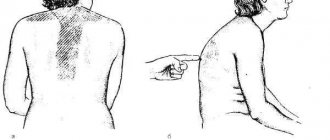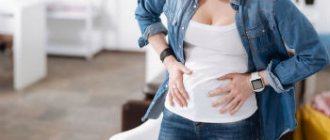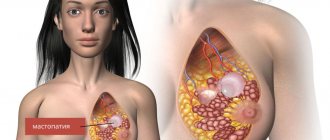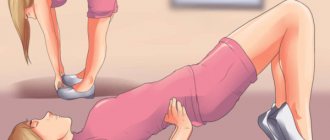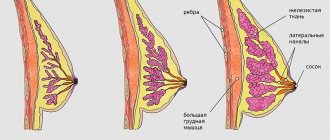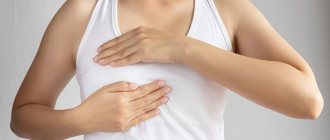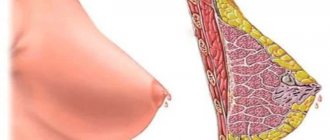Mammary glands during menstruation
The localization of the hormone estrogen is in adipose tissue, so an increase in its amount leads to a significant increase in the volume of those organs that consist of adipose tissue.
This also includes female breasts. The glands become noticeably larger, making blood flow more difficult. The result is swelling, a feeling of heaviness, and pain. Breast pain before and during menstruation is normal. But if your breasts hurt after your period, this may indicate a disease. To avoid problems, regular breast self-examination is necessary, as well as timely consultation with a doctor.
Chest pain after menstruation or, as it is called, mastalgia, requires a mandatory examination - passing:
- ultrasound examination;
- mammography.
Only this will allow the doctor to accurately diagnose the disease and select the correct treatment.
Neoplasms
Tumors in the breast can cause pain during certain periods of the cycle. At the same time, tumor cells are able to both respond to changes in hormonal levels and be indifferent to them. Breast lumps can be either benign or malignant.
Detection of a tumor in the mammary glands occurs first during examination and palpation by a mammologist, and then during an ultrasound scan. A characteristic feature of neoplasms is pain in only one breast, and not in both, which becomes the main distinguishing feature during the early diagnosis of the disease.
In addition to tumors, pain can be caused by cysts - hollow structures filled with fluid isolated from the main tissue. Like a tumor, a cyst causes pain only in the part of the breast where it is located, but sometimes the pain can radiate to the armpit or rib area, making it difficult to determine the location of the problem.
Nature of pain
Normally, your breasts should not hurt after your period. If the critical days have passed, and she continues to get sick, this is a signal that abnormal processes are occurring in the body. There are several types of pain in the mammary glands, and each of them will indicate different conditions:
- cyclic pain appears on clearly designated days of the menstrual cycle; usually the mammary gland begins to ache 5-7 days before the arrival of menstruation. This occurs due to increased estrogen levels and increased body fat. As soon as menstruation occurs, this symptom ceases to bother the woman. Such painful sensations are repeated in each cycle, which explains their name. This is usually an aching pain that is felt in both glands;
- non-cyclic pain can occur on any day of the menstrual cycle, its causes are not related to monthly hormonal changes in the female body, and pain can manifest itself in only one breast;
- Acute pain is one of the normal options when the mammary gland hurts very much before menstruation, but it can also be caused by a breast injury or a cyst bursting inside the gland. To find out the exact cause, it is better to undergo an ultrasound examination. If there is mastitis, then acute pain is accompanied by fever and general weakness.
There are several other types of pain in the mammary glands:
- burning – it intensifies when touching the chest and can be projected onto the back;
- stabbing – occurs in attacks and is localized only in one of the glands;
- aching – is felt constantly, but has different intensity. With such a symptom, a woman can put off visiting a doctor for a long time, because she quickly gets used to the unpleasant sensation.
Intercostal neuralgia
Intercostal neuralgia is a pain syndrome caused by pinching, irritation or inflammation of nerve endings in the intercostal space. The pathological condition can be provoked by pinching of the roots of the spinal nerves located near the spinal column.
With neuralgia, sharp and burning pain occurs in the intercostal space in the area of the mammary gland. It can radiate to the lower back or under the shoulder blade. The intensity of the pain syndrome increases sharply with a deep breath, coughing, sneezing, screaming, as well as with sudden movements of the body and physical activity.
In some cases, pain is felt in the mammary gland. A neuralgic attack instantly spreads to nearby tissues and reaches the connective tissue layers of the gland that separate its lobes. The pain intensifies with pressure on the mammary gland.
Gradually the illness will pass, and after a few days the pain will completely disappear. Intercostal neuralgia does not affect the condition of breast tissue.
When pain is normal
Normally, the breasts become full and painful before the onset of menstruation. This happens due to the increased level of estrogen, which is responsible for “childbirth”. If a woman gave birth and carried a child, her mammary glands would be ready to produce milk. But since there was no birth, the breasts fall again and become soft and painless. Therefore, the norm is soreness of the mammary glands only before or during menstruation. If your period has passed and your chest hurts, you need to go for an examination to a doctor.
Breast pain a week after period
If your breasts are sore a week after your period, this is a bad sign for most women. Since, under favorable circumstances, a week after menstruation, breast pain only occurs during pregnancy. For those women whose menstrual cycle lasts only 21 days. As a result of stress or climate change, the cycle may be disrupted and take less time than usual. Then pregnancy is possible in women with a longer period.
Usually, if your breasts hurt a week after your period, this is a symptom of the disease:
- mastitis;
- mastopathy;
- syphilis;
- oncology;
- hormonal imbalance;
- thyroid diseases;
- colds.
Sometimes a pulled pectoral muscle is included in the same list. But pain in a damaged muscle is very different from sensations directly in the mammary gland. It is usually very difficult to confuse, but it is also impossible to neglect.
Attention! Sometimes sensations similar to a pectoral muscle strain occur due to a pinched nerve in the spine.
Breast pain two weeks after period
If your mammary glands hurt 14 days after your period, a girl will have to solve the age-old philosophical question: is the glass half empty or half full? The average length of the menstrual cycle is 28 days, and the breasts swell before the period, not after it. Swelling of the mammary glands and the appearance of pain 7-14 days before the onset of menstrual bleeding is normal.
Only those who have an established menstrual cycle of 35 days should be concerned. The reasons in this case will be the same as those listed above.
Fibrocystic mastopathy
Soreness and engorgement of the breast can be a symptom of fibrocystic mastopathy. The disease is characterized by impaired development of glandular and connective tissue of the breast. The pathological process causes a deterioration in the blood supply to the mammary glands, resulting in stagnation and the formation of cysts.
A cyst is a capsule with fluid that forms in the ducts of the gland. Its size ranges from a few millimeters to several centimeters. The cyst can become inflamed and fester. In rare cases, its cells are degenerated. Due to the ability of cysts to transform into malignant tumors, fibrocystic mastopathy is considered a precancerous condition.
Pain in one or both mammary glands is the main symptom of fibrocystic mastopathy. The sensations can be mild or intense. Along with the pain, the woman feels that her breasts are swollen. The mammary gland swells and increases in size. After ovulation, lumps may appear in the breasts. Painful sensations sometimes occur in the armpits, shoulder and shoulder blade on the side of the sore chest.
Such changes in breast tissue are caused by the influence of the hormone progesterone. Most often, unpleasant symptoms stop with the onset of menstruation. However, as the disease progresses, the painful period lengthens. Mastalgia (breast pain) does not stop after menstruation.
In the later stages of pathology, the breasts hurt throughout the entire menstrual cycle. A sick woman develops neuropsychic disorders, chronic diseases worsen, and sleep is disturbed. Anxiety and worry about cancer appear.
Some women with fibrocystic mastopathy have serous, milky, bloody, or purulent discharge from their nipples.
The disease can appear after an abortion, large pregnancy, or abrupt cessation of breastfeeding. The disease develops in women who do not have regular sex life. It can be triggered by regularly occurring stressful situations, endocrine diseases and liver diseases.
The main causes of chest pain after menstruation
Pain in the mammary glands can be of a different nature - sharp, burning, pressing. This is caused by the accumulation of a large amount of fluid in the tissues of the mammary glands. Full, painful breasts after menstrual periods are the result of a number of reasons:
- pregnancy,
- hormonal imbalance in the body,
- tumor processes,
- mastopathy.
Are your breasts full and swollen before your period or do they appear during ovulation? This condition is understandable and is associated with a hormonal surge in a woman’s body. However, if swollen breasts persist on the 5th, 6th, 7th day of the menstrual cycle, then the woman should seek the advice of a specialist to clarify the possible cause and undergo a detailed examination.
Pregnancy
This is the most common cause of breast swelling. If menstruation has already ended, but the mammary glands remain enlarged, this means an increase in the level of the hormone estrogen in the blood. The reason for this may well be pregnancy. At first, a woman may not pay attention to this fact, associating it with recently passed “women’s” days.
After fertilization, a global restructuring of the entire female body begins. This occurs due to the fact that the embryo promotes the release of hormones and active substances; progesterone prepares the mammary glands for the pregnancy process. Due to this, the shape of the lobules changes, and the mammary glands become enlarged. Next, prolactin forms the subsequent process of lactation and milk production.
It is due to these hormones that the mammary glands begin to swell more and more, maintaining their tension and heaviness after menstruation. Also, when pregnancy occurs, placental hormone (chorionic somatotropin) begins to be produced, which also promotes the growth of the mammary glands.
Hormonal disbalance
Fluctuations in hormones are observed during pregnancy, menopause, breast diseases and in patients taking hormonal medications and birth control pills. In some cases, stress and antidepressants affect hormonal levels.
Pain after menstruation is a non-cyclical pain that occurs in the mammary glands under the influence of high levels of estrogen. Normally, the concentration of the hormone should decrease. If this does not happen, the discomfort persists and the next menstruation occurs. This happens in pregnant women (about 15% of cases).
Early signs of pregnancy can include not only chest pain, but also nausea, discomfort in the lower abdomen, increased fatigue, darkening of the nipples and menstrual-like discharge. Bleeding occurs when a fertilized egg implants into the uterine cavity.
Sensitivity to pain varies from woman to woman. Some patients complain of severe swelling and pain. In the second category, the mammary glands practically do not hurt. There is slight swelling.
You cannot take painkillers if the causes of chest pain after menstruation have not been established. If a new life has arisen in a woman’s body, many medications are prohibited from being used.
With the onset of menopause, chest pain after menstruation is explained by the gradual replacement of glandular tissue by adipose and connective tissue. The symptom is also associated with:
- Hot flashes and sweating.
- Cardiopalmus.
- Increased fatigue.
- Irregular menstrual cycle.
- Change of mood.
- Changes in blood pressure.
Gynecological diseases
If your breasts hurt after menstruation, this may be due to diseases of the reproductive organs. In this case, the lower abdomen often hurts.
Discomfort is possible when a woman has the following inflammatory diseases of the genital organs:
- endometritis;
- endometriosis;
- adnexitis;
- vulvitis;
- inflammation of the fallopian tubes or ovaries.
Gynecological diseases often cause hormonal imbalance, which ultimately affects the general well-being of a woman, the condition of the mammary glands and leads to symptoms of mastalgia.
Oncology
The most unpleasant thing that can happen if breast pain persists after your period has passed is an oncological tumor. The diagnosis of cancer is especially relevant for industrial regions, where, according to medical research, there is a high level of cancer. The most effective treatment for cancer is surgery. Doctors recommend contacting for examination and treatment as early as possible. The earlier the tumor was detected, the greater the chance of defeating the disease.
Chest pain can be the result of hormonal imbalance, tumor development, or pregnancy. In any of the above cases, you should consult a doctor and clarify the diagnosis.
Diseases of the mammary glands and reproductive organs
These may include mastitis, mastopathy, cystic formations, and gynecological diseases.
Mechanical damage
The chest may hurt if it is excessively compressed, bruised (after a fall) or hit. This condition can coincide with menstruation and create a situation where menstruation has passed, but the chest hurts.
Sexual infections in the body
Diseases of the female reproductive system may well cause swelling of the mammary glands, as well as pain in the lumbar region. Such diseases include adnexitis, vulvitis, endometriosis, inflammation of the uterus and ovaries, and syphilis.
Heat and sunstroke
Overheating or prolonged sunbathing can cause migraines and nausea. If, along with these symptoms, your breasts become full and sore a week or earlier after your period, and your body temperature rises, you may suspect heatstroke. When sunbathing, the mammary glands should be covered with a cloth and treated with sunscreen.
Mastopathy
This is the second most common cause of breast swelling. It is characterized by the formation of a small compaction in the mammary gland, due to which an increase in size occurs. This is a disease that is often found in modern young girls. Unfortunately, almost every second woman sooner or later faces a disease such as mastopathy.
The main reasons for the appearance of mastopathy include excessive use of contraceptives, late childbirth, and refusal to breastfeed. The danger of this disease is that it can occur at any time of the menstrual cycle and even after it.
Possible sources of the problem
It has already been mentioned that chest pain can occur on the eve of menstruation; it is called cyclic. Another type of pain is called non-cyclical and is characterized by soreness of the mammary glands on other days not associated with menstruation.
Cyclic pain that occurs during menstruation is called mastalgia in gynecology. In such situations, both mammary glands hurt equally, and external changes are similarly affected. More than half of the female part of the entire earth is familiar with mastalgia.
But non-cyclic is characterized by independent discomfort in one or two areas of the mammary gland. Breast pain after menstruation for many reasons.
Let's look at some of them:
Pregnancy. After conception, the female body adjusts to “pregnant” work under the influence of appropriate hormones. Changes also affect the breast lobe. They become noticeable even at the stage before menstruation. And if tenderness of the mammary glands appears against the background of scanty bleeding, this may indicate implantation of the fertilized egg or the threat of miscarriage, be careful and do not delay visiting the doctor. Hypersensitivity and “fullness” of the breast are characteristic of a short period of pregnancy; over time, the intensity of irritation decreases.
Menopausal changes that occur against the background of a decrease in reproductive function.
Using oral contraception or other medications that affect a woman’s hormonal levels.
Diseases of the mammary glands, including the inflammatory process in them.
Mastopathy is the growth of glandular or connective tissue of the breast. Symptoms include lumps, discharge from the nipples, and possible elevated body temperature. The sources of the problem are hormonal imbalances caused by various organs.
Hormonal disorders. If you suspect this, it is recommended to consult a doctor to clarify the diagnosis.
Injuries. Chest pain after menstruation may appear after an injury. It is not necessarily the result of a bruise or blow; it can be provoked by wearing a tight bra. Popular products have proven themselves especially so: with bones and “puch-up”.
Operations. Perhaps the cause may be an anatomical change in the mammary glands after surgery.
Oncological changes. Most often, pain occurs in cycles, with irregular exacerbations. The catch is that obvious symptoms appear late in the course of the disease.
Therefore, it is so important, at the slightest discomfort in the chest, not related to menstruation, to undergo an examination by a mammologist. Early diagnosis and detection of the problem is the key to quick and effective treatment.
Diseases in the field of gynecology: adnexitis, vulvitis, endometriosis, etc. Related pathological conditions can also cause pain in the mammary glands: osteochondrosis, heart disease, lymph nodes of the armpits, etc.
Sexually transmitted infections, including those transmitted through bed.
Parasitic disorders, such as echinococcosis. Breast pain as a result of an external factor: insufficient sex life, discomfort of the mammary glands at the beginning of active physical activity. And many other sources of the problem.
Dermatological diseases
Why can the skin of my nipples get sore? Due to chronic dermatological diseases: eczema, dermatitis, psoriasis. Herpetic rashes or symptoms of candidiasis (thrush) can be localized on the chest area (especially around the nipples). These infections usually develop when the immune system is weakened. With skin diseases, the skin flakes and becomes dry, cracks, becomes covered with crusts or blisters, itches and itches.
Cardiac dysfunction and neuralgia
Often, if immediately after menstruation your chest hurts, the cause may be a neuralgic disorder or heart failure. In the first case, the spasm intensifies when trying to take a deep breath and may appear or disappear when changing body position. Pathologies of the cardiovascular system are accompanied by arrhythmia and surges in blood pressure. Sometimes the appearance of a symptom is associated with disorders in the structure of the spine.
The causes of pain in the mammary glands can be obesity, problems with the elimination of fluids, as well as the presence of addictions (smoking, drinking alcoholic beverages, caffeine, carbonated water).
Diseases of other organs
Not only diseases of the reproductive system can cause pain in the mammary gland; the following pathologies can be a possible reason for the fact that it is full:
- hormonal disorders due to problems with the thyroid gland and endocrine system;
- osteochondrosis;
- inflammation of the lymph nodes in the armpits;
- heart diseases;
- mechanical damage to the chest (compression, blows and bruises).
Wearing incorrectly selected underwear and abnormal physical activity
Such factors can provoke unpleasant consequences. The bra should not put too much pressure on the mammary glands, and the cup should not be an inappropriate, too small size.
As a result of abnormal physical activity, for example, when visiting the gym or lifting weights, it also becomes possible for pain in the chest to appear after menstruation.
What could be the consequences?
Manifestations of any discomfort in the chest area after the end of menstruation should be immediately consulted with a specialist, since this may indicate many problems associated with health status and be a dangerous symptom that can lead to a number of undesirable consequences.
As a rule, the presence of pain is a sign of hormonal imbalance in the body, which can cause functional disorders in the genitourinary, reproductive, and endocrine systems, and cause the development of inflammatory, infectious, or even oncological diseases
Therefore, it is so important to immediately visit a doctor, carry out a series of diagnostic measures and procedures, and identify the cause of the pain. In no case should you be afraid or postpone this visit, because nipples can often hurt due to hypersensitivity of the nipples themselves or the skin of the breast
Only a specialist will be able to determine whether the failure is a consequence of a violation of the regularity of sexual activity or a sign of the development of pathology, establish the correct diagnosis and prescribe treatment if necessary. Only a doctor can decide whether we are talking about minor temporary deviations associated with premenstrual syndrome, or about problems such as the development of mastopathy, cysts, and oncology.
A timely diagnosis and the necessary therapy can today even cope with diseases such as cancer, without leading to more serious health problems and, as a consequence, costly long-term treatment.
Why does breast discharge appear after menstruation?
Chest pain may be accompanied by breast discharge. This phenomenon is considered normal in the middle of the cycle only in case of pregnancy. Some women may also experience fluid discharge from their nipples when pressure is applied just before their period or when they are very aroused.
A week or two after the “critical days” and with a negative pregnancy test, pain in the mammary glands and discharge from the breast is a sign of pathology that needs to be looked for and eliminated. It could be intraductal papilloma, mastitis or something else.
Why does the doctor ask what color the discharge is?
Discharge from the mammary glands is, in principle, not normal unless it is milk during lactation. At the appointment, the doctor is required to ask clarifying questions about the color, nature and consistency of pathological discharge from the nipples, since this is part of the differential diagnostic search.
If, when pressing on the nipple, thick, sticky brown discharge or greenish discharge appears, then the most likely cause of this condition is ectasia of the milk ducts, which occurs in women during the menopausal period.
If a woman's breasts begin to secrete fluid from light to dark shades of brown, this should suggest intraductal papilloma, which requires timely diagnosis and treatment.
If scanty purulent discharge from the nipples with an unpleasant odor is detected, which occurs during breastfeeding, mastitis should be suspected. In this case, only one breast will be bothered; local soreness may be noted in it, and the skin above the source of the inflammatory process seems to be “burning.”
IMPORTANT! If any discharge from the mammary glands appears, you should consult a specialist to identify the cause of its appearance and appropriate treatment!
Manifestations of sarcoma
If your period has ended and your breasts hurt, this may be a sign of developing breast sarcoma. Sarcoma is a neoplasm that grows from connective tissue. This is one of the fastest growing forms of malignant tumor.
It can be detected by enlarged lymph nodes, deformation of the mammary gland, lumps and whitish discharge from the breast. The protruding tumor has a knobby, bumpy surface. As it grows, the skin over it becomes thinner and acquires a purplish-bluish tint. The subcutaneous venous pattern is clearly visible on it. Over time, an ulcer appears above the tumor. A disintegrating sarcoma may bleed.
The tumor can grow slowly, spasmodically, or rapidly. Neoplasms with a relatively favorable prognosis develop gradually. The process can take many years. If rapid growth of the tumor is observed, it reaches large sizes within a month.
Sometimes the rapid development of a malignant process is accompanied by symptoms characteristic of a breast abscess. An abscess is a cavity in the chest filled with pus.
https://youtu.be/IpD3oXMjn8w
What is not the norm?
Is it normal that your period has passed, but your breasts are painful? If this symptom does not depend on the menstrual cycle, this is an alarming signal. It indicates the presence of certain pathological conditions. Breast pain after menstruation can occur due to increased estrogen in the blood, and due to other negative changes in the body.
Alarm signals:
- discomfort spreads to local areas, and not to the entire chest;
- the pain is sharp or burning. It causes a lot of suffering for a woman;
- the level of pain does not change over time, but may, on the contrary, increase. If you have such symptoms, you need to consult a doctor to identify the cause of these negative changes and stop their progression, otherwise it may never end.
Signs of fibroadenoma development
If your period has passed and your chest hurts, fibroadenoma may be the cause. This is a benign neoplasm formed from overgrown glandular breast tissue. The tumor has a round shape, soft and elastic consistency. Its size ranges from 0.2 to 7 cm. Fibroadenoma moves freely under the skin and does not cause discomfort at an early stage of development, so it is often discovered by chance during a routine examination. With fibroadenoma, a small amount of fluid may leak from the nipples.
If the tumor grows rapidly and reaches a significant size, pain appears in the chest, regardless of when menstruation occurred. Most often, pain occurs with the leaf-shaped form of fibroadenoma, characterized by rapid growth and sharp aching pain.
Fibroadenoma is a hormone-dependent tumor. It often develops in girls during adolescence, in women during pregnancy, while breastfeeding, and also during courses of hormone replacement therapy during menopause.
Women who take hormonal contraceptives for a long time are at risk. Fibroadenoma occurs more often in girls who have an irregular menstrual cycle. Frequent abortions, a short period of breastfeeding, sudden refusal to breastfeed a child, diseases of internal organs and obesity increase the likelihood of developing a tumor.
Under the influence of unfavorable factors, fibroadenoma cells can degenerate into malignant ones. Therefore, when a tumor is detected, its tissue must be analyzed. Due to the high risk of developing cancer, it is recommended to remove the fibroadenoma.
Influence of food and drugs
It is useful to know that diet largely affects the condition of the mammary glands. Its deterioration is observed as a result of abuse of certain types of foods and after taking certain medications. These are:
- caffeine;
- methylxanthine derivatives;
- foods high in salt;
- fatty foods and dairy products;
- oral contraceptives
Caffeine and methylxanthine-based drugs have significant vasodilatory properties. They affect the vessels supplying blood to the mammary glands. This effect certainly leads to pain, swelling after the end of the menstrual cycle, and increased sensitivity.
Foods high in salt can also cause chest pain. This is due to their tendency to retain water. This feature often leads to pain in the chest and abdomen after menstruation.
Fatty foods and dairy products significantly affect the tone of the mammary glands. Due to the presence of animal fat in food, swelling and the development of pain symptoms are often observed. The mechanism of its effect has not been reliably elucidated, but there is an assumption that it is associated with the hormones of dead animals. In addition to fatty foods, dairy products can have a certain negative effect. This is due to its allergenicity.
Oral contraceptives (pills) often contain additives that lead to breast pain after menstruation.
Doctor's conclusion
Chest pain after menstruation often indicates that a malfunction has occurred in a woman’s body. If your breasts are swollen after menstruation, it is possible to temporarily eliminate the pain with the help of the drug “No-spa” (it helps some, not others, but it certainly won’t make you any worse). There is no need to mask the disease, wait for it to go away on its own, or try to recover without medical help, with the help of herbs and miracle remedies, as this in some situations can lead to a very sad outcome.
What to do if your breasts hurt after your period?
The first thing a woman who is worried about pain in the breast area should do is contact a gynecologist. You should not take any painkillers uncontrollably and constantly, as they can only smooth out the clinical picture and eliminate symptoms, but will not affect the elimination of the root cause.
How long can you endure pain and when to contact a specialist?
If a woman is experiencing severe pain in the lower abdomen after her period has ended, she should immediately consult a doctor, especially if the pain is accompanied by the following symptoms:
- A woman notices that after the end of menstruation she has spotting that has an unpleasant odor;
- The woman has had a fever for several days, and it is practically impossible to bring the temperature down to normal values.
When to see a doctor
For women who begin to experience breast pain after menstruation, it is advisable to consult a specialist for preventive purposes, even if there are no other symptoms of pathology.
Do you want to know why your breasts hurt after your period? Then watch this video:
A mandatory visit to the doctor is carried out if:
- there are accompanying pains in the lower abdomen;
- breasts have increased significantly;
- there is discharge from the nipples;
- in the absence of menstruation, slight bleeding occurs;
- an unpleasant odor emanates from the intimate area;
- the temperature rises and persists for more than 3 days;
- The skin on the chest is very sensitive.
All of these signs can be harbingers of serious diseases that require immediate treatment. Before starting a diagnosis, a pregnancy test or hCG analysis is always done, since some examination methods are contraindicated for pregnant women.
Women should be careful about their health. Even minor changes in the mammary glands are harbingers of disorders that lead to serious complications. Regardless of age, you should not ignore it if your period has arrived and your breasts hurt
UpSize is an effective breast enlargement product on the market
Many modern women are faced with the need for aesthetic bust modeling. Almost everyone wants luxurious shapes. And it’s not surprising, because the neckline has always been an area of increased attention for men.
As a result of daily use of the cream, after 3-4 weeks the volume of the breast increases, the shape becomes more rounded and toned; the skin is elastic and velvety.
The cream has undergone clinical trials conducted by specialists from the World Health Organization in 14 countries. Thousands of women have been convinced of the effectiveness of UPSIZE cream.
- Deoximiroestrol
has a pronounced rejuvenating effect, promotes breast growth;
- Pueraria Mirifica Root Extract
effectively nourishes and protects the skin;
- Rose essential oil
increases skin firmness and elasticity, eliminates and prevents stretch marks.
We recommend!
Do you look with envy at busty beauties who, with just their appearance, attract all the looks of men? And they seem to have some kind of natural femininity. But a small bust is no longer a death sentence! Find out how to enlarge your breasts once and for all... Read more »
(function(w, d, n, s, t) { w = w || []; w.push(function() { Ya.Context.AdvManager.render({ blockId: 'RA-449633-8', renderTo : 'yandex_rtb_R-A-449633-8', async: true }); }); t = d.getElementsByTagName('script'); s = d.createElement('script'); s.type = 'text/javascript '; s.src = '//an.yandex.ru/system/context.js'; s.async = true; t.parentNode.insertBefore(s, t); })(this, this.document, 'yandexContextAsyncCallbacks '); (function(w, d, n, s, t) { w = w || []; w.push(function() { Ya.Context.AdvManager.render({ blockId: 'RA-449633-22', renderTo : 'yandex_rtb_R-A-449633-22', async: true }); }); t = d.getElementsByTagName('script'); s = d.createElement('script'); s.type = 'text/javascript '; s.src = '//an.yandex.ru/system/context.js'; s.async = true; t.parentNode.insertBefore(s, t); })(this, this.document, 'yandexContextAsyncCallbacks '); (function(w, d, n, s, t) { w = w || []; w.push(function() { Ya.Context.AdvManager.render({ blockId: 'RA-449633-22', renderTo : 'yandex_rtb_R-A-449633-22', async: true }); }); t = d.getElementsByTagName('script'); s = d.createElement('script'); s.type = 'text/javascript '; s.src = '//an.yandex.ru/system/context.js'; s.async = true; t.parentNode.insertBefore(s, t); })(this, this.document, 'yandexContextAsyncCallbacks ');
(function(w, d, n, s, t) { w = w || []; w.push(function() { Ya.Context.AdvManager.render({ blockId: 'RA-449633-3', renderTo : 'yandex_rtb_R-A-449633-3', async: true }); }); t = d.getElementsByTagName('script'); s = d.createElement('script'); s.type = 'text/javascript '; s.src = '//an.yandex.ru/system/context.js'; s.async = true; t.parentNode.insertBefore(s, t); })(this, this.document, 'yandexContextAsyncCallbacks ');
How to identify the causes of pain
Every woman needs to have the skills to examine her own breasts for lumps and other manifestations of disease. If you have pain after menstruation, you should examine the condition of the mammary glands yourself. Then you need to seek medical help. A mammologist, using mammography, ultrasound, biopsy and other examination methods, will reconstruct the course of the disease, explain to the patient why the pain occurred, make the correct diagnosis and select effective treatment methods.
Diseases of the mammary glands most often require treatment with anti-inflammatory or hormonal drugs. In some cases associated with the presence of neoplasms, emergency surgery is indicated.
You should remember that self-medication and taking hormonal drugs without a prescription from a specialist are inadmissible. Particular caution must be taken during pregnancy.
Examination by a gynecologist and principles of treatment
The main rule of therapy is timely consultation with a doctor. The purpose depends on the cause that provoked the appearance of the symptom.
If unpleasant sensations occur regularly, experts recommend keeping records with the dates of spasm occurrence, levels of its severity, duration and accompanying symptoms. Such a diary will help reproduce the full picture of the pathological sign at a doctor’s appointment.
Usually, a trip to the gynecologist begins by asking the patient about the nature of the pain. Then the doctor palpates the mammary glands and armpits to identify unnatural deformations and seals. If there are any, the woman is sent for a mammogram or ultrasound examination, and is also asked to undergo tests.
Benign tumors are removed surgically. Single small cysts cannot be removed, but are observed. Malignant tumors undergo chemotherapy.
Mastopathy is treated with special medications in the form of tablets and hormone-containing ointments.
How to examine your breasts
Women who experience breast pain after menstruation should see a specialist. The examination is carried out in several stages:
- Initially, the breasts are examined at home;
- after palpation is performed by a specialist;
- The final stage of diagnosis is a mammogram.
Twice a year, a woman, regardless of the presence or absence of abnormalities, should visit a therapist. From the age of 35, it is recommended to undergo a mammogram once every calendar year to exclude the development of diseases that precede breast cancer. The examination makes it possible to identify any changes and their nature.
Necessary diagnostic measures
If you cannot determine the exact cause of chest pain yourself, then you should consult a doctor. Especially if alarming symptoms arise and your stomach and chest hurt after your period. These signs may indicate serious pathological problems.
To conduct a complete diagnosis, it is necessary to undergo a number of such studies:
- Mammography is a modern method of research using laser illumination of breast tissue;
- Ultrasound examination, not only the mammary glands are visible, but also the lymph nodes near them;
- ductography, this method is used as an auxiliary method; it is used to study structural changes in tissues;
- a puncture is used when a formation is detected, the contents are sent for a biopsy to determine the nature.
Breast examination by age
To prevent pathological changes in tissues, a woman should undergo a gynecological examination annually. Also, if symptoms of breast ailments occur after menstruation, it is recommended to make an appointment with a mammologist.
Basic diagnostic measures:
- Mammography.
- Pneumocystography.
- Needle biopsy.
- Ultrasonography.
- Ductography.
If, as a result of these studies, the doctor does not identify a pathology, then the discomfort has a physiological etymology. Otherwise, you need to undergo appropriate therapy.
How to conduct a self-examination of the mammary glands?
It is extremely important for every woman to perform a breast self-examination after her period, around days 7-11. This will help to identify fibrocystic mastopathy at the initial stage of development, breast cysts, and also detect tumor formations in the breast in the early stages.
The breast self-examination algorithm is as follows:
- Stand near the mirror and examine your breasts: you should look at the shape of the breasts, the color of the skin of the nipples, your arms should be lowered during the examination.
- Raise both hands behind your head and examine your chest while in this position. Determine if there is a change in the shape or size of one of the mammary glands, pay attention to the color of the skin.
- The right hand must be thrown behind the head. Then, with slow, smooth, massage circular movements, palpate the right mammary gland, paying special attention to compactions, swelling and thickening. The same steps should be repeated with the left breast.
- Using the thumb and index finger of one hand, apply gentle pressure to the base of the nipple and look for any discharge from the nipple. Do similar actions with both the left and right mammary glands.
- Take a supine position. Using circular movements, applying light pressure, you need to feel the breasts, starting from the edges of the mammary gland towards the nipples.
- Using light circular movements, you should palpate the left and right armpits, paying attention to the presence of enlarged lymph nodes. If any, you should consult a specialist.
You can cope with pain using home methods
- If your nipples are cracked and sensitive, lubricate them with baby cream or sea buckthorn oil. Panthenol is also suitable.
- Warm baths and showers are effective. Such procedures reduce the intensity of pain and have an antispasmodic effect.
- For mastitis, you can apply a softened cabbage leaf to the affected breast.
- Honey compresses are useful. You can add mumiyo, sea buckthorn oil, and aloe juice to honey.
- Take care of your breasts so as not to provoke unpleasant sensations again. And wear loose underwear.
Recommendations for all women
To avoid experiencing nipple pain after your period, follow these recommendations:
- Maintain good breast hygiene.
- Be careful when choosing a bra so that it does not squeeze or rub your nipples. Buy a bra that fits!
- Use hypoallergenic body and laundry detergents.
- Contact your gynecologist in a timely manner if your menstrual cycle is disrupted or if there are other problems with the reproductive system.
- Avoid chest injuries.
Mammologist's recommendations
Following these recommendations will help reduce discomfort or prevent its occurrence:
- Correct selection of underwear. The bra should be made of good fabrics and of high quality, be comfortable and hold the bust well without squeezing it.
- Regular sex life.
- Getting rid of bad habits.
- Daily routine and proper nutrition.
- Correct selection of hormonal contraception (the drugs should be selected by a gynecologist based on test results).
As for proper nutrition, it is recommended:
- exclude fatty, smoked, spicy, salty foods from the diet;
- include fresh vegetables and fruits in your daily diet;
- before menstruation, reduce the consumption of chocolate and coffee.
There are many reasons that cause pain and discomfort in the chest. A woman can only determine or exclude pregnancy on her own. If she is sure that there is no conception, she urgently needs to visit a mammologist.
Ways to feel better
There are several recommendations from doctors that can help reduce chest pain. These include:
- Dieting. You should exclude fatty and junk foods, eat more vegetables and fruits.
- Drink enough water. It is important to know that drinking too much often provokes strong and painful sensations in the chest.
- Eat less salt.
- You should not drink caffeinated drinks if your breasts swell after your period. Liquid is often released through the nipples - this is a sign of hormonal imbalance, in which it is especially important to monitor nutrition.
- Wear comfortable and comfortable underwear. It is better to replace a tightening bra made of artificial fabric with a loose and comfortable one.
- Exercise.
- Lead a healthy lifestyle and do not smoke tobacco products.
These recommendations will help improve your overall health even during sudden hormonal changes.
Prevention of pain
Reducing the risk of developing breast diseases and disorders that cause pain and other problems is much easier than it seems at first glance. You just need to follow simple but important rules:
- eat right, give up fatty, spicy, salty foods, include more dairy products, meat, fish in your diet
- quit smoking
- do not abuse alcoholic beverages
- organize your daily routine correctly, leaving enough time for rest
- do not exercise, avoid excessive physical activity during menstruation
- do not overexert yourself – neither emotionally nor physically
- do not expose the body to high temperature changes - overheating, hypothermia
- wear convenient, comfortable, appropriate-sized underwear that does not cause discomfort while wearing
- Regularly - once every six months - undergo examination by a gynecologist
Any deviations from the norm, be it pain in the mammary glands, discharge from the nipples, pulling, unpleasant, painful sensations in the lower abdomen in the middle of the menstrual cycle - all this is a serious reason for immediately contacting a gynecologist. Only a correct diagnosis and timely treatment will help avoid dangerous and unpleasant consequences.
Preventive measures
Unpleasant sensations can be reduced by following a number of simple rules. For prevention purposes, it is recommended:
- wear underwear made from natural fabrics, avoid squeezing the glands;
- no smoking;
- do not abuse alcohol;
- have regular sex life;
- minimize stress and factors of emotional instability;
- periodically take vitamin complexes;
- avoid temperature fluctuations, especially hypothermia;
- Do not use hormonal drugs or contraceptives without a doctor’s prescription.
It is better to choose underwear without wires, with thick inserts. You should adhere to a balanced healthy diet, avoid eating fatty, salty foods, and coffee. You need to feel your breasts yourself every month and visit a mammologist once a year.
